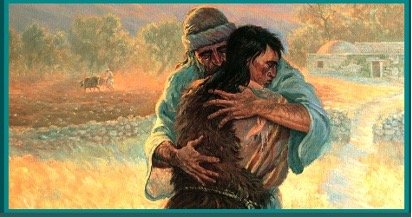
Gospel according to Saint Luke Lk 1:1-4; 4:14-21:
Since many have undertaken to compile a narrative of the events that have been fulfilled among us, just as those who were eyewitnesses from the beginning and ministers of the word have handed them down to us, I too have decided, after investigating everything accurately anew, to write it down in an orderly sequence for you, most excellent Theophilus, so that you may realize the certainty of the teachings you have received.
Jesus returned to Galilee in the power of the Spirit, and news of him spread throughout the whole region. He taught in their synagogues and was praised by all. He came to Nazareth, where he had grown up, and went according to his custom into the synagogue on the sabbath day. He stood up to read and was handed a scroll of the prophet Isaiah. He unrolled the scroll and found the passage where it was written: “The Spirit of the Lord is upon me, because he has anointed me to bring glad tidings to the poor. He has sent me to proclaim liberty to captives and recovery of sight to the blind, to let the oppressed go free, and to proclaim a year acceptable to the Lord.” Rolling up the scroll, he handed it back to the attendant and sat down, and the eyes of all in the synagogue looked intently at him. He said to them, “Today this scripture passage is fulfilled in your hearing.”
The Word of God: Freedom and Joy
Luis CASASUS President of the Idente Missionaries
Rome, January 26, 2025 | III Sunday in the Ordinary Time.
Neh 8: 2-4a.5-6.8-10; 1Cor 12: 12-30; Lk 1: 1-4;4,14-21
It is worthwhile to make an effort of imagination and place ourselves in the Square of the Water Gate, where the First Reading takes place. Although the people of Israel had a clear religious sentiment and were grateful to Yahweh for having brought them out of slavery in Babylon, now the difficulty was internal: corruption, violence, all kinds of vicious customs, abuse of the weak….
The people gathered in the Square shed tears of repentance and then were invited to celebrate with joy, having understood that Yahweh was still at their side despite their unfaithfulness to the covenant with Him.
Although our present culture and historical situation are very different, the effect of the Word of God is similar: not merely informative, but transformative, when it falls on welcoming soil. One simple piece of evidence is enough: what the Old Testament proclaimed, we see realized in Christ, so that we understand that God the Father truly has a plan of salvation.
Not only that, Jesus himself concludes by reading the prophet Isaiah and saying that this Scripture, which you have just heard, has been fulfilled today. This was astonishing. After centuries of prophecy, He declared that it was He in whom all that had been announced would come true. This explains why He had to begin by performing some wonders, such as restoring sight to the blind or casting out demons, so that people would believe and not think Him mad.
A story is told about a world boxing champion in the 70s of the last century, a man who was never known for his humility. During a flight, the plane encountered bad weather. The pilot warned of a “turbulence zone” and ordered the passengers to fasten their seat belts, and everyone complied except this boxing champion.
The flight attendant noticed and asked the boxer to comply with the pilot’s order. The answer was: Superman does not need a seat belt. The stewardess did not waste a second and replied: Superman does not need a plane either.
This boxer made a presumptuous claim and was extremely arrogant. Jesus made a bold claim, but he was only affirming his true identity and what he had received from the Father as his mission.
As we see in the First Reading, welcoming the Word of God demands a period of recollection, a reflection, a true liturgy that is different when we read it personally or in community. In any case, each of us must reflect on the concrete way in which each page of Christ’s life should be manifested in our lives.
It is said that the man who arrested the Apostle James was converted after hearing James speak at his trial before Herod Agrippa and was executed with him. The word, coupled with the testimony, immediately transported him to the kingdom of heaven.
No wonder we call Christ the Word Made Flesh. Benedict XVI expressed this clearly in his Apostolic Exhortation Verbum Domini:
It is important that every form of proclamation bear in mind, first of all, the intrinsic relationship between communication of the Word of God and Christian witness. The very credibility of our proclamation depends on this. On the one hand, the Word must communicate all that the Lord himself has told us. On the other hand, it is indispensable, by means of witness, to make it credible, so that it does not appear only as a beautiful philosophy or a utopia, rather than as a reality that can be lived and that gives life in itself.
To highlight the importance of the Word of God, in 2019 Pope Francis declared the Third Sunday in Ordinary Time a feast of the Word of God. He himself recalled last year, on this feast, how the first disciples were moved by the word they heard from Jesus, before seeing the miracles he would later perform:
If you abide in my word, you are truly my disciples and you will know the truth, and the truth will set you free (Jn 8: 31-32).
—ooOoo—
The Second Reading gives us an interesting perspective on the value of the Word. The first three gifts in the list that St. Paul mentions refer to the condition of apostle, prophet and teacher. It is no coincidence that all three are related to the proclamation of the Word. It does not refer to “classes of Christians”, although St. Paul suggests that not everyone possesses the totality of the gifts.
However, precisely because of this, we must aspire to be apostles, prophets and teachers, remembering that even Jesus himself tells us that the Kingdom of God belongs to those who are like children, and that is why we can and must learn from them to have pure feelings, to be incapable of living a double life and of having hidden intentions.
Perhaps that is why, today, St. Luke begins his Gospel by stating that he tried to learn from those who are servants of the Word, not experts in sacred texts, but those who have dedicated their lives to bear witness to what they have seen and heard, a beautiful definition of what it means to be a servant of the Word.
St. Luke declares that others, before him, have tried to relate the things that happened among the believers, but he gives us a lesson of apostolic zeal and devotion to the Word by beginning the account of the public life of Jesus with this episode of the Master’s life, which Matthew and Mark will place in later moments of their narrative. For Luke, Christ’s fidelity to the written Word, to what was announced by the prophets, has a singular importance.
Likewise, as we feel ourselves humble protagonists of the divine plans, we can be filled with hope, patience and joy in the face of difficulty, recognizing that we are following the path always dreamed of by our heavenly Father, even if at times our eyes are clouded and the road becomes arduous and difficult.
Our Father Founder, when he speaks to us of the Vow of Cathedra, of the permanent disposition to dedicate our reason and our study to the service of the apostolate, points out the ultimate intention that should preside over our work of defense, elaboration and reflection in any area of thought: to show that in the Word of Christ is the fullness of knowledge:
I try to base all my actions, all my conferences, my intellectual activity, my communication with my neighbor, on the Gospel, keeping in mind, at the same time, the corroboration of the Magisterium (A Dialogue With Three Voices).
—ooOoo—
The liberation of which Jesus speaks to us today, as an initial message in his public life, is not the breaking of the chains that bind us to a political power or to some people with the spirit of domination. Nor does he refer to bodily ailments, some of which, it is true, he occasionally cured. His concern, his real affliction is caused by all that separates us from the kingdom of heaven, that which enslaves us, that which prevents Inspiration from taking us ever further. The demands of the world, of the devil and of the flesh, the three enemies of the Word.
Christ explained it in a convincing way in His Parable of the Sower.
The brambles are the cares of the world, moral or immoral, necessary or superfluous, but capable of absorbing all our energy.
The devil is represented by birds of innocent appearance, attractive, even, which could be summarized well in the word captivating, because it traps us in what we judge necessary and becomes indispensable. In this way, our spiritual sensitivity is degraded. Pope Francis has warned of this many times, saying that – for many reasons – man today is chained by indifference.
The flesh resembles stony ground, where perseverance becomes impossible, because of the fear of self-denial, of every form of offering one’s life and fame. The instinct of happiness, at the head of all other instincts,
Many of us may consider the term Church militant, used by the Council of Trent to denote those who are still pilgrims on earth, to be somewhat inaccurate and unbecoming of modern language. But, a faithful and intelligent saint like St. Jerome said that God has put us here for the struggle, so that we will always struggle. Therefore, this place, this valley of tears, is not a place of peace, it is not a place of security, but of struggle and war.
It is up to us today to open the eyes and ears of the soul to choose without hesitation what the Word gently suggests to us over the tyranny of the world, the devil and the flesh.
_______________________________
In the Sacred Hearts of Jesus, Mary and Joseph,
Luis CASASUS
President













